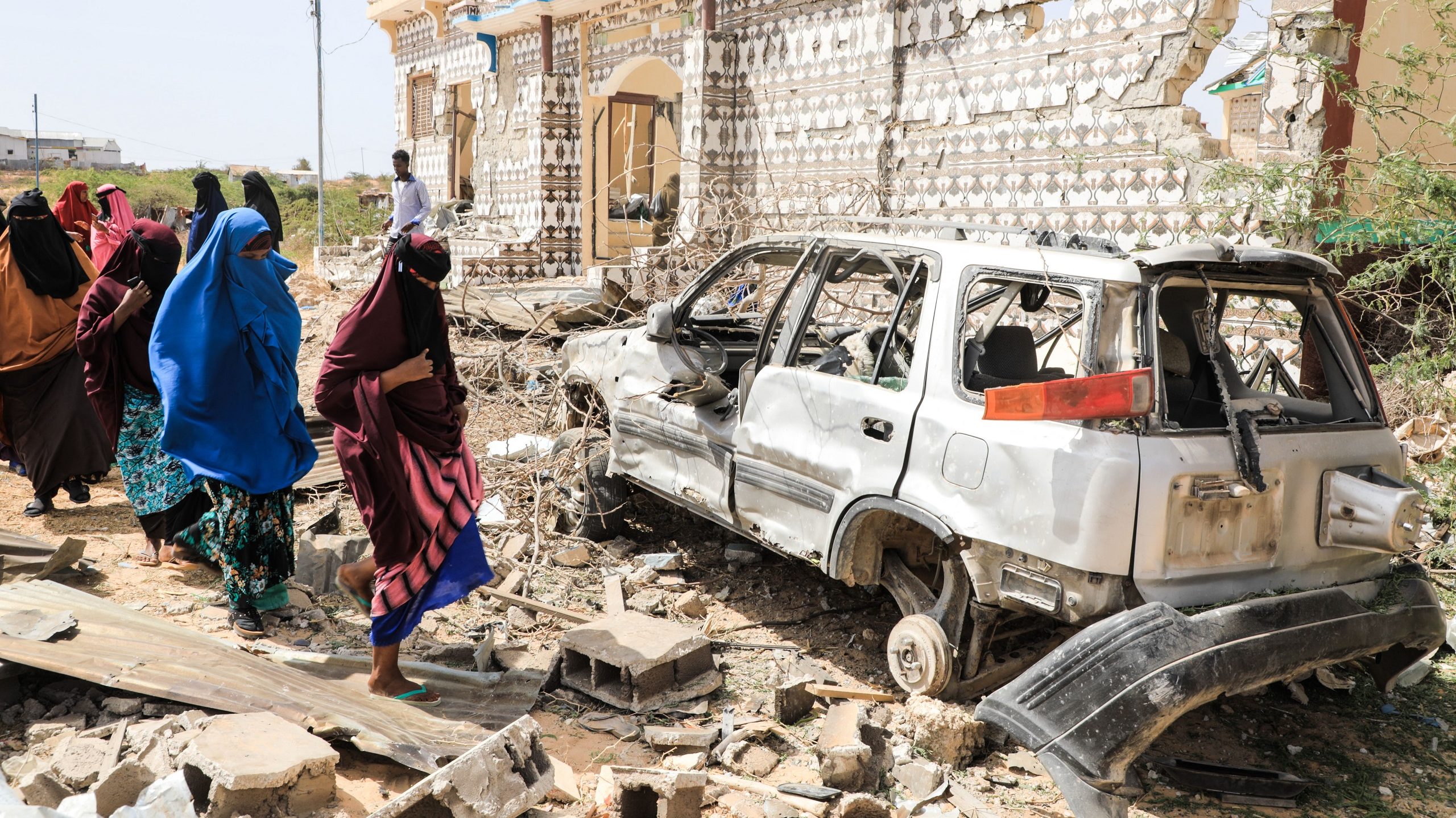Killing of Top al-Shabab Man ‘Will Likely Escalate Somalia Attacks’
Experts say the Mogadishu government is determined to carry out a coordinated liberation offensive against the terrorist group, with help from international allies
A senior leader and co-founder of the al-Shabab terrorist organization was killed in an airstrike in Somalia on Saturday in what the Somali government called a joint operation with international partners and a regional expert warned could yield further violence.
“Abdullahi Nadir, a top leader of #Alshabab terrorists, wanted by Somali government for long time has been killed in operation conducted by Somali National Army and international security partners in Haramka village in Middle Jubba region, on 01-10-2022,” the Somali Information Ministry wrote on Twitter on Sunday.
Abdullahi Nadir, a top leader of #Alshabab terrorists, wanted by Somali government for long time has been killed in operation conducted by Somali National Army and international security partners in Haramka village in Middle Jubba region, on 01-10-2022.#Somalia https://t.co/yJsfQL6Wts
— Ministry of Information, Culture & Tourism (@MOISOMALIA) October 2, 2022
The United States confirmed Monday its participation in a strike that killed an al-Shabab leader on the same date as the Somali government reported killing Nadir but did not specify his name.
“In coordination with the Federal Government of Somalia, US Africa Command conducted an airstrike against the al-Shabaab [sic] militant network in Somalia on October 1. … The command’s initial assessment is that the strike killed an al-Shabaab leader and that no civilians were injured or killed,” said a statement released Monday by the United States Africa Command.
Nadir was tapped to be the next leader of al-Shabab and was also the acting head of council and finance for the terror organization. A $3 million bounty was previously put on his head by the United States, indicating the importance it placed on the strike.
Dr. Ardian Shajkovci, director at the American Counterterrorism Targeting and Resilience Institute, told The Media Line that following the killing of Nadir, the country was likely to endure an increase in the intensity of al-Shabab attacks.
In fact, he added, several coordinated retaliatory attacks against the Somali government had already taken place in Beledweyne, a city in central Somalia, and other regions shortly after the killing of Nadir was publicly announced.
Such attacks, which included car bombs, have left more than 20 dead and 35 wounded. “This unfortunate trend is likely to continue in the future,” said Shajkovci.
Al-Shabab is an Islamic fundamentalist insurgent group based in Somalia, which has been denominated as a terror organization by several countries including the US, Australia, Canada, the UAE, and the UK. Al-Shabab is also currently the largest and most active al-Qaida network in the world, responsible for many high and low-profile terror attacks in its region. Somalia’s current president, Hassan Sheikh Mohamud, who was elected in May by the country’s lawmakers, has embarked on a determined battle to bring down al-Shabab.
The US military withdrew its troops from Somalia in late 2020, but in May 2022, US President Joe Biden approved the deployment of about 500 troops back to Somalia in coordination with its government. Since then, the US has conducted several airstrikes against al-Shabab.
Abdurahman Sheikh Azhari, director at the Center for Analysis and Strategic Studies, a Somalia-based think tank, said that the elite Somali security forces normally operate jointly with the US forces in the country.
Shajkovci added, “The US and Turkey have actively been training Somali Danab and Gorgor commandos respectively.”
Azhari said that the Somali president has announced that his government, along with the African Union and other partners, is currently in the final stages of a coordinated liberation offensive against al-Shabab in Somalia.
Ahmed Abdi Koshin, the secretary of the Somali Defense Committee, a member of the federal parliament, and former director-general at the Defense and Internal Security Ministry, told The Media Line that since Mohamud’s election in May, the Somali security forces aided by local militias protecting their territory from al-Shabab, have significantly weakened the organization.
“And as we speak, the fighting is going on many fronts,” he said.
“It will certainly boast the morale of the Somali security forces and encourage them to go after remaining remnants of AS,” noted Koshin.
He said that al-Shabab is currently on the back foot facing multiple defeats in Somalia’s hinterland.
“Touted as the next in line to lead al-Shabab, his [Nadir’s] killing is a significant blow for AS and its current leadership,” he added.
The killing of a high-profile terrorist leader like Nadir is as important as targeting the wider al-Shabab terrorist network, said Shajkovci.
But he added, “Al-Shabab has a powerful intelligence-gathering unit (Amniyat), which will likely remain active and seek ways to both carry out attacks and continue to infiltrate the Somali government and military.”
Al-Shabab also has a demonstrated and sustained capability to fundraise in areas under its control, including online and through the Somali diaspora, Shajkovci explained. Additionally, the group relies on both high and low-level intensity terrorist attacks, he said.
While it would be premature to say that al-Shabab is now in decline, said Azhari, “for sure they are feeling the pressure on several fronts where a possible coordinated offensive will be underway,” he continued.
Estimating al-Shabab operational capacity is a daunting task, given its operational presence in Somalia and beyond and the ability to maneuver clan dynamics, fundraise, and attract recruits to its cause, including foreign fighter support, said Shajkovci.
The group’s survivability is also a function of the Somali government’s ability to deliver adequate governance and security in the country, he warned.
“The Somali government and international humanitarian efforts need to reach especially the al-Shabab-controlled areas.”


